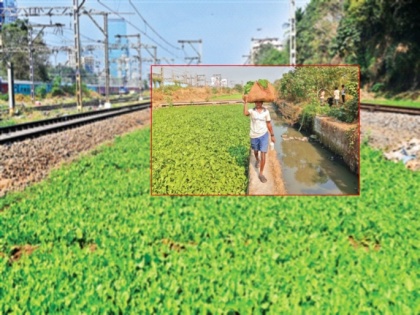Vegetables Harvested Along Railway Tracks Use Toxic Sewage Water, No Action by Administration Despite Complaints
By Lokmat English Desk | Published: February 6, 2024 12:48 PM2024-02-06T12:48:22+5:302024-02-06T12:52:16+5:30
Mumbai: During the train journeys in Mumbai, one finds small orchards of green vegetables along the railway tracks. These ...

Vegetables Harvested Along Railway Tracks Use Toxic Sewage Water, No Action by Administration Despite Complaints
Mumbai: During the train journeys in Mumbai, one finds small orchards of green vegetables along the railway tracks. These are nothing but orchards of spinach, fenugreek, and similar vegetables. While the greenery in a concrete forest is eye-pleasing, it has been argued for years that these vegetables are harmful to health as they are cultivated with the use of wastewater. However, there has been no serious research on the topic. Fed on toxic sewage floating along railway tracks, these vegetables eventually end up on the plates of Mumbaikars.
A large amount of sewage water is used to grow vegetables in Mankhurd, Kurla, Mulund, and Kalwa. These vegetables are grown at more than 125 places in the Mumbai division.
The practice of growing vegetables based on toxic sewage near railway tracks is also common in Thakurli, Kalyan. It includes vegetables like radish, spinach, fenugreek, and onions. Brinjals are also grown, but they are sent to hotels. Thakurli, on the way to Kalyan, near Patripu, vegetables are grown in outer space after leaving the tunnel on the way to Kalwa. On rainy days, rainwater is available, but the vegetables are grown with the water available from nearby polluted creek. A few years ago, action was taken against vegetable vendors who put the health of citizens at risk by growing such vegetables.
Vegetables are grown using effluents released by chemical factories in slums along the railway line, and water is released in open spaces using other products. Such leafy vegetables ripen quickly, and they are immediately harvested, cleaned, and sent to the market for sale.
"Vegetables have been grown along the railway tracks for the last 25 years. A case was also filed in court. But vegetables are planted to prevent encroachment on land, the railways said. But toxic water released from chemical factories is used for vegetables. Investigations have revealed that these vegetables are dangerous and can cause diseases like cancer. Still, the railways are lax about the action and are playing with the lives of Mumbaikars."
- Madhu Kotian,
President, Mumbai Railway Pravasi Sangh
The possibility of toxins going into the stomach
"Medical science has not yet mentioned whether eating those vegetables causes cancer. However, the possibility of lead or other toxins going into the stomach due to the vegetables in that water cannot be ruled out."
- Dr. Sachin Alamel,
Oncologist, Hinduja Hospital
The digestive system and kidneys may be affected
"Household and industrial wastewater is used to grow vegetables on land near railway tracks. If the sewage is very polluted, vegetables do not grow on such sewage. However, there are times when the flow of sewage is low or the sewage in which pollution is less visible is used to grow vegetables. If that vegetable comes into your meal, it affects your digestive system. Blood may be affected. Kidneys may be affected."
- Avinash Kubal, environmental expert